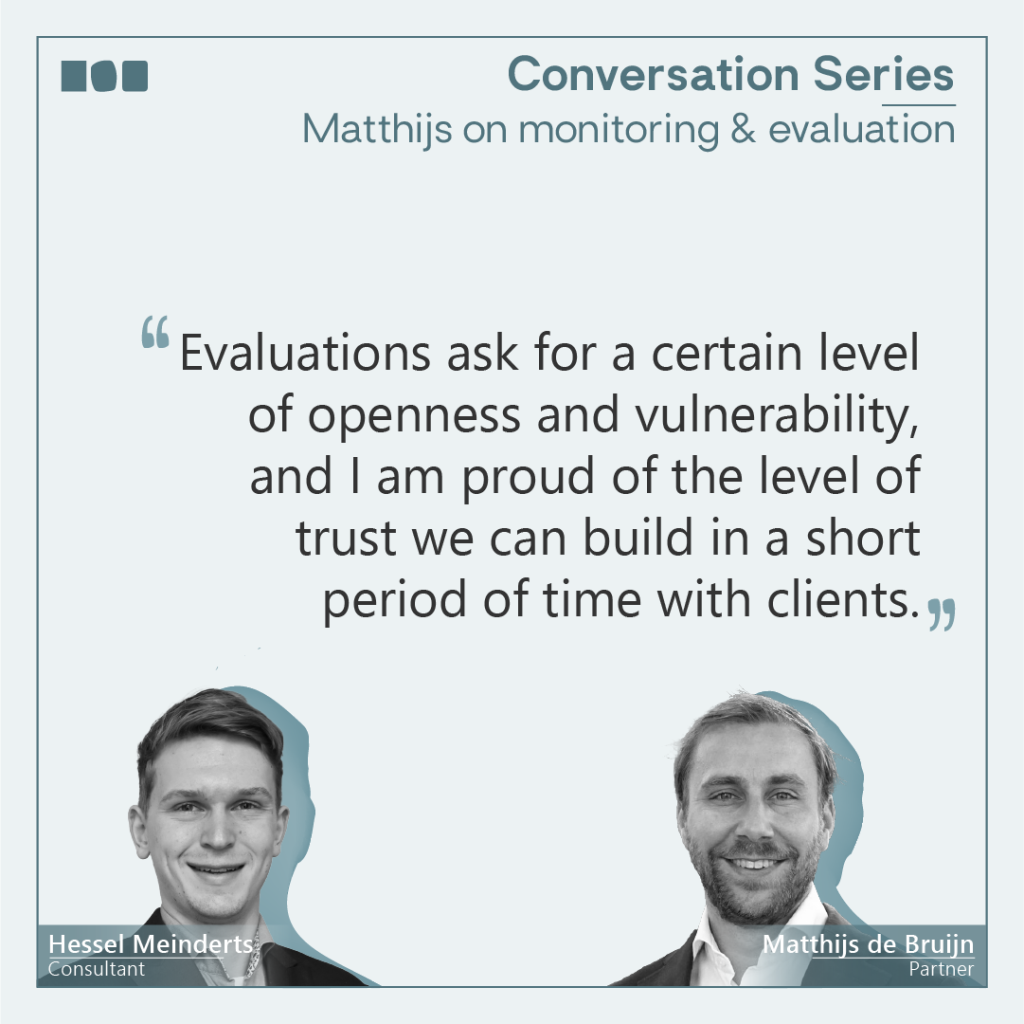Conversation series: On our approach to monitoring & evaluation with Matthijs de Bruijn
Matthijs de Bruijn is Partner at Steward Redqueen and head of the Steward Redqueen monitoring & evaluation services. In this Conversation Series, we sit down with him to explore Steward Redqueen’s approach to monitoring, the obstacles inherent to this line of work, and the key drivers that keep the work exciting.
In the firm, you focus on monitoring and evaluation, how did you actually get involved in that field?
I joined Steward Redqueen in 2012 and coincidentally got directly involved in evaluations. At first it mostly concerned evaluations of impact-focused investment funds in emerging markets that were invested by British development finance institutions CDC Group (now BII), where we had a long-term contract as an external independent evaluator. For a sample of their funds, we reviewed the practical implementation of their investment strategy, financial performance as well as their ESG management and impact results. After working on one, I asked to do more of those, and gradually further specialised in the field.
Were these types of evaluations with a focus on financial and impact results already common back then?
No, evaluating the combination of financial and impact performance still was quite a novel thing. Evaluations were almost solely performed of publicly funded programmes and activities. Around that time the concept of ‘impact investing’ was really still just emerging. In impact investing, actually monitoring your impact results and learning from what worked and what not is key. Every impact-focused initiative essentially is a story, and I quickly knew that combining data and opinions into a story that provides accountability to investors and learning for future direction got me really excited. Over the years, we gradually expanded our evaluation activities and focus.
What unites organisations that you support through evaluations?
There is not one type, but I think the common denominator of our clients is that that they intentionally steer for impact, and this can range from fighting climate change and inequalities to improving nutrition and health, and actively understand and manage that progress towards impact results. They range from impact investment firms, development banks, to non-profits, philanthropies and public actors. Nearly all are private sector or focused on influencing the private sector. At the same time the focus on financial return and impact can vary quite a bit, as we work for purely concessional financiers that are mostly impact-focused to more commercial investors that also have an impact objective.
What do you bring as a firm that is different from others?
In terms of our approach, I think the biggest differentiator is that as a company we are not purely an evaluation firm, and we work with clients on topics of sustainability and impact more broadly, for instance on strategy development, data management and tooling. We want to be more than just an evaluator and can bring more than just the evaluation. While we are robust in our evaluation methods and research process, it means that we are generally perceived as quite pragmatic and find it important recommendations are really thought through and actionable. In the end, the results of an evaluation are a basis for organisational learning, and for a conversation on improving operational processes or sharpening strategy.
What is a common pitfall you see in evaluations?
Well, adequate monitoring of results is the foundation for any evaluation, and sometimes we jointly conclude that some work is needed before even starting an evaluation. What you see at times is that in the design phase of an investment fund or programme the ambition level to show and track results is really high. This can result in quite detailed and complex Theories of Change with indicators that are comprehensive and detailed but also hard to collect data on in practice. One of our goals as evaluators is in supporting these organisations in advising on more pragmatic and realistic monitoring systems and practices, so that real learning and accountability can take place on an ongoing basis, and not only when it’s time to conduct an evaluation. When you have a well-functioning monitoring system in place, evaluations become a much smoother process with better results.
Finally, perhaps a bit of a provocative question: evaluations sometimes are seen as somewhat stuffy, what do you like about them and keeps you going?
To be honest that’s probably true. And you know, evaluations are not an easy field to be in. You have to take in huge amounts of documents and data very quickly, and get to a level of understanding of an organisation and intervention that is at par with the staff working there itself. To do that in one or two months really is hard work. As a person, you probably need to have a rather high dose of curiosity in your character. But as mentioned earlier, when the story starts to unfold, it becomes really interesting. There also is a lot of human interaction, as we often have to speak to various stakeholders that all have a different viewpoint. And perhaps the aspect I am most proud of in the work we do is the level of trust we build with our clients. Evaluations ask for a certain level of vulnerability, and for organisations to be open and transparent with us. This makes it important to gradually build that trust with our clients in the process. The fact that that trusted relationship always develops and often continues after an evaluation is completed really keeps me going.




















